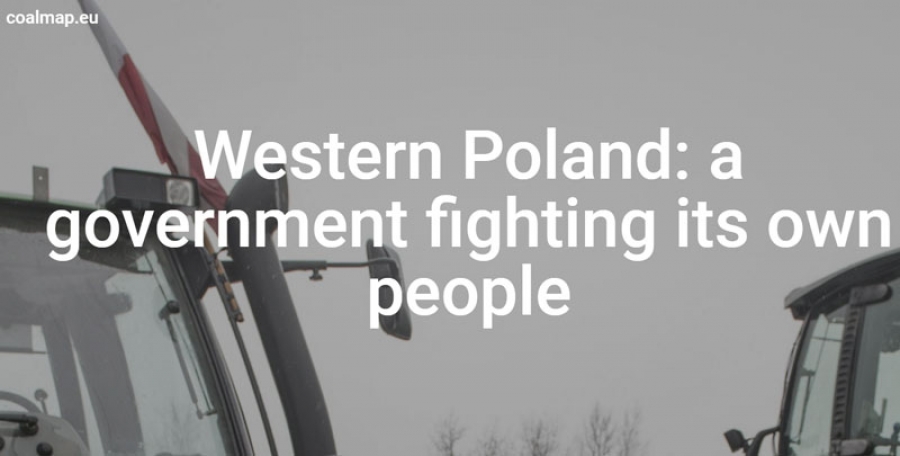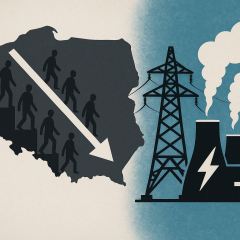In 2009, inhabitants of Gubin and Brody already said no to a new coal mine in the region in local referendums. People lived close enough to Germany’s border mining region to be able to observe the effects of the coal industry on the environment, from coal dust to falling water levels. This was not only affecting health but also agricultural output in a region where farming is the main occupation.

Krobia and Miejska Górka commune
Far from putting an end to mining plans, the referendums actually marked the beginning of the struggle in Gubin Brody. What followed could only be called a “bulldozing” of locals opposing coal by all levels of government apart of the local one (local mayors and councils have been either supporting of or more open to arguments against mining) using legal and administrative tools and the media.
In the western part of Poland, the land mostly belongs to the state for historical reasons, with local farmers usually leasing it. Over the last years, the state agency in charge refuses to prolong leases or only gives them for short periods of time, making long term planning and accessing funds from the European Union practically impossible.
Information critical of mining could be found only in a newspaper printed and distributed with own resources by environmentalists acting locally, while most of the local and national media depicted the new mine invariably as an investment of strategic importance both to enrich state coffers and to create local employment.
“There is, of course, no guarantee that the mine will be economically feasible, quite the contrary,” says Kuba Gogolewski from the Foundation Development Yes, Open-Pit Mines No, arguing that the pro-coal propaganda in the media was based on the false premise of a successful investment.
“Not only are most of the Polish coal mines losing money, but prospects for coal around the world are gloomy. Demand for coal is in a slump and it will stay that way at least for the next couple of years, new state of the art plants in Germany will never recover their construction costs, coal companies are taking losses, all big energy companies are writing down their coal assets to diminish losses. It’s only if you live in this Polish Pandora Box that you don’t see this.”

fot. Lukasz Giza
Polish governing parties, whether it was the liberal Civic Platform which ruled from 2007 until 2015, or the conservative Law and Justice, in power 2005-2007 and again since the fall of 2015, have been unabatedly arguing that coal is essential for the future of Poland. The Gubin Brody mine was deemed a project of “public benefit” meaning it has privileged status in Polish legislation and it is easier for the investor to either expropriate people from the area of the mine or to implement necessary changes in local legal documents to enable mining.
People from Gubin Brody have been put with their backs against the wall. Still, over the past years, with the help of Polish green groups EKO-UNIA and Greenpeace Poland and international environmental lawyers from Frank Bold Foundation, they started slowly pushing back.
To begin with, the only ace in their deck was that the mine was not included in local spatial plans which meant PGE would not easily get the needed permits to construct the mine.
But the mine was being pushed by regional authorities and representatives of the central government: it made its way, in one form or another, in spatial planning documents at higher administrative levels, which meant it would have to eventually be included in local plans too.
A 2011 National Spatial Planning Concept announced that a future ministerial document would list deposits of strategic importance across the country. The ministerial document was published in the fall of 2015, with Gubin Brody on the list, meaning that it will automatically go as exploration area into spatial planning documents prepared at voivodeship level (voivodeship is the largest administrative unit in Poland).
In the name of Gubin Brody locals, Frank Bold challenged the legally binding nature of the national planning concept. While the constitutional court agreed with Frank Bold that the document was not legally binding, it still said that it could form the basis of voivodeship spatial planning.
At the moment, the spatial plan of the voivodeship does not include the Gubin Brody mine (the vague wording in the spatial plan was challenged in court by the Gubin municipality with assistance from Frank Bold and the highest administrative court in Poland confirmed what the lawyers said, that the mine is not specifically included in the plan). This is important because, if it were included in the voivodeship plan, it would get the status of privileged investment and it would have to be included in the local spatial plan no matter what local authorities want.
So now regional authorities are forced to alter the voivodeship spatial planning to include the mine more explicitly. The procedure is supposed to take a couple of years and include public consultations, so locals have now gained a space where they can make their opposition to the mine heard.
In order to put even more pressure in favor of the mine, PGE already initiated the procedure to have an environmental impact assessment for the mine approved by Polish authorities (without waiting to see the mine included in the spatial plans at local and regional level). The EIA will be assessed by a regional directorate for environmental protection (it was moved from the remit of local authorities, the latter being too sympathetic to voices critical of mining). Again, there will be a chance for public consultations during which locals and their allies can express their opinions about the EIA and call for either a total ban on the mine or at least for more environmental and social safeguards to be included in the planning.
Finally, Frank Bold also submitted a complaint to the Aaarhus Committee (the UN body monitoring the lawful implementation of projects with environmental impact into neighbouring countries) arguing that local opinion in the border region was not taken account during the drafting of the current voivodship spatial planning. The committee is expected to rule still, but if it agrees with the locals, it would deal a strong reputational blow to Polish authorities.
“This is a very difficult campaign because the Polish legislation is definitely in favor of the investors,” says Tomasz Wlodarski, director at Frank Bold Polish office. “Nevertheless, there are many lines of legal action against the mine and, using those legal avenues, we will do our best to protect the rights of the local communities.”
“The people on the ground may be wary, but there is hope for them despite the political situation,” says Kuba Gogolewski. “Since the humain chain organised there in 2014, the stories of people in Gubin Brody have become visible to the world and this brought a lot of international solidarity. We will continue to mobilise international allies to oppose this mine.”
“Importantly, our government may soon have to face the fact that there may not be enough financing for all the energy projects it wants to see financed. In Poland, politicians want to have nuclear, and coal, and shale gas. But in reality the shares of our energy companies are losing value, our biggest coal complexes function with massive losses. Our banks do not have a lot of money and there is no international financing available for coal. There may just not be money out there for this mine.”
Wielkopolska
The story of Gubin Brody may be the best known internationally, but it is certainly not unique in Poland, a country where successive governments have been advocating for the expansion of the coal industry.
Locals in central-western Wielkopolska region (around the town of Konin), proud farmers for generations, have been mobilizing in the hope to persuade the government in Warsaw to put an end to a plan by private company ZE PAK (Zespół Elektrowni Pątnów -Adamów -Konin) to build a coal mine over their lands.
In south Wielkopolska, 22 villages where thousands of people live are at risk of being destroyed to make way for an open cast lignite mine, expected to stretch over 10,000 hectares and to come together with a coal plant of 1,000 MW capacity.
At the moment, ZE PAK, the investor, has gained an approval from the Ministry of Environment to prepare the geological documentation of the Oczkowice coal deposit, located in the districts Rawicz and Gostyn in Wielkopolska. This procedural measure is an important step towards granting of permits to mine for brown coal in the area. The ministry’s decision to grant a concession for exploration to PAK is of dubious legality, argue the locals, because it was made without consulting the locals and despite them objecting via a letter sent to the ministry by 176 people before the concession was granted.
Already existing coal mines in the region (Turek and Konin) have led to the diminishing of water levels, contamination of groundwater reservoirs with chemicals from mining, and air pollution. Like in Gubin Brody, these not only have an impact on the health of people but also on the quality of agricultural production in an area that prides itself to be a vegetable and food exporter.
Locals from Wielkopolska argue that their lands and waters will be completely destroyed by mining, without a possibility to ever come back to the original scenery. It has been estimated that farmers and food processors around the mining area would incur losses of almost 12 billion Polish zloty (about 3 billion euros) during the 50 years of scheduled mine operation.

Sylwia Mackowiak
If the mine plans go ahead, thousands of locals will be expelled from lands they have inhabited for generations. Ironically, a wind farm and eleven wind turbines – which currently provide green energy for 40,000 homes – would be destroyed to make way for the mine. According to polls, almost 70 percent of people in the Gostyn and Rawicz districts oppose the new mine.
A coalition against the mine has emerged, bringing together some 5,000 farmers and 31 companies from the south part of the Wielkopolskie region. The opponents to the mine are represented primarily by two groups: the Association of Production Companies („Przedsiębiorczość dla ekologii” – “Entrepreneurship for ecology Association”), consisting of entrepreneurs, and the Farmers’ Association („Nasz Dom” – “Our home” Association), established by residents and farmers. Opponents of mining have been advocating against coal during meetings with national authorities and European institutions.
“The creation of the mine will bring irreversible changes in the environment, the landscape and – above all – it will change the nature of business activities here from agriculture to highly industrialized,” comments Leszek Wenderski, the head of the Association of Production Companies.
“The mine will make 22 villages disappear, but apart from that thousands of families will lose a major source of income,” he added. “The mine will bring work to only a few. The coal plant will only offer to locals the lowest paid jobs, while qualified specialists will be brought in from the outside.”
In January this year, over 3,000 people turned up to protest against the plans to open the new mine, slowing down traffic on the major road between cities Wroclaw and Poznan.
While for now the mine seems set to go ahead, opponents are determined to keep fighting it.
“ZE PAK wants to intimidate people. They tell everyone that only a few troublemakers are opposing the mine,” says Sylwia Maćkowiak, the leader of the Farmers’ Association Nasz Dom. “But over 3,000 people and 500 tractors were present during our January protest! The fact is that we are all against the mine. And we want our voice to be heard in Warsaw, because it is the government there which will finally decide about our future.”








